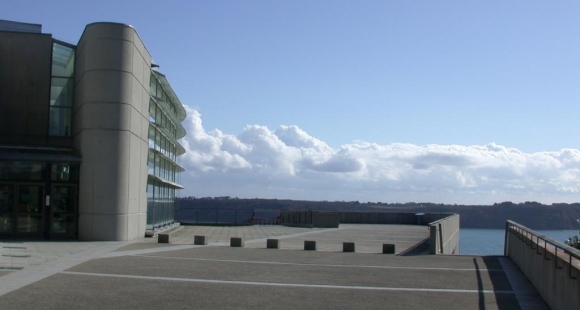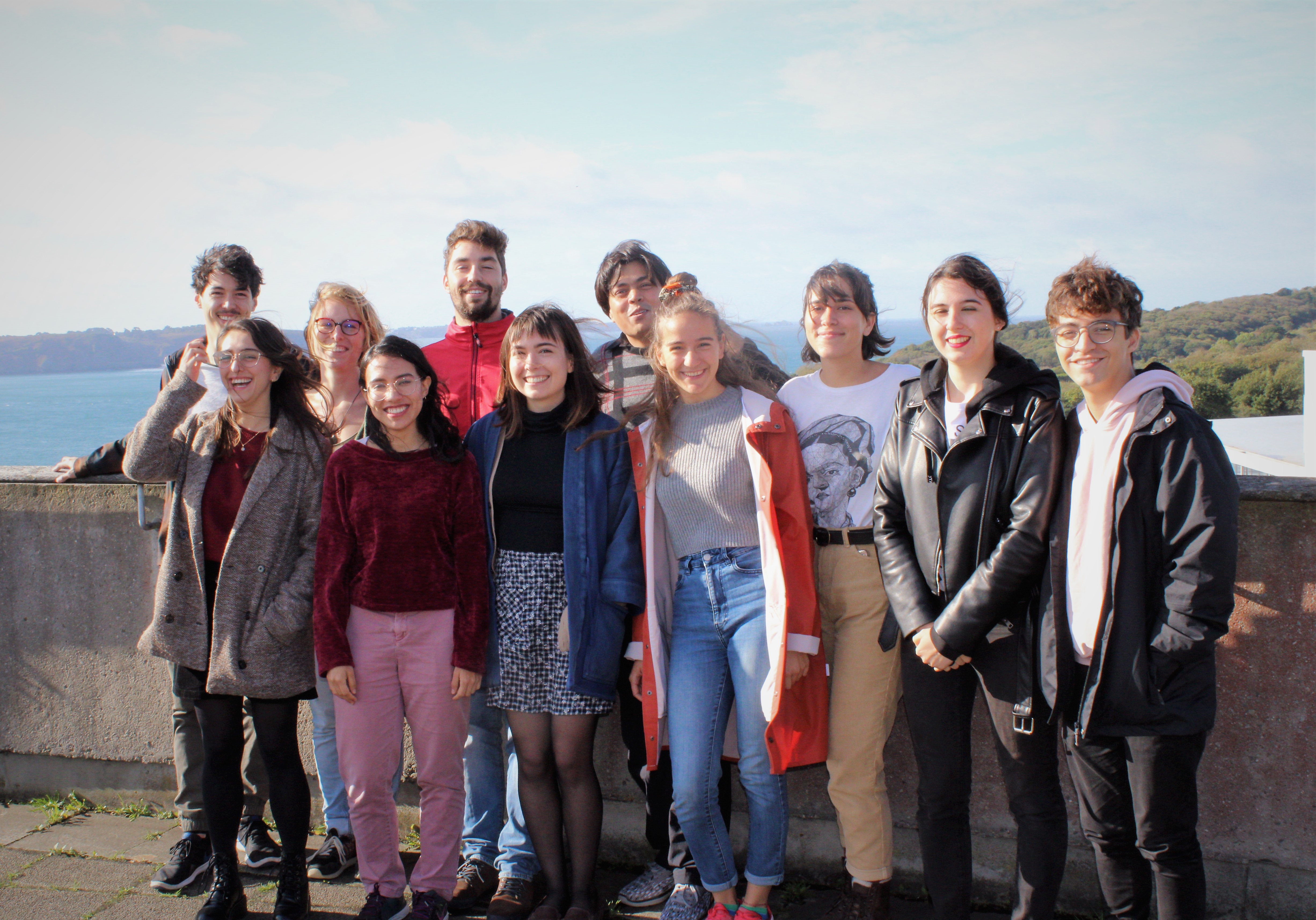University of Western Brittany
General Information
UBO is a medium-sized university (around 20,000 students) founded in 1971, offering a wide range of programmes in all fields. The Université de Bretagne Occidentale (UBO) is located in Brest, in Brittany, on the north-western coast of France. It is a multicampus university, with the main site in Brest and satellite campuses in Quimper and Morlaix. Brest is an hour from Paris by air, or 3,5 hours by train.
IUEM is a leading centre for Marine Science innovation through its research, teaching and monitoring missions. Its strong multidisciplinary approach spans from research in Human and Social Sciences to the Sciences of the Universe and Life Sciences, putting IUEM at the top of its field nationally. IUEM is situated in the Brest Technopole (Technology Centre), where it unites over half of the French scientific community working in the Marine Sciences. IUEM has seven laboratories (joint research units involving the UBO, CNRS, IRD, Ifremer and UBS) employing nearly 500 permanent and contract researchers, teacher-researchers, engineers, technicians and administrative staff. As an internal school of UBO, IUEM offers eight master’s programmes in the field of Marine and Coastal Sciences (SML), very closely associated with its laboratories, and also hosts the Doctoral School of Marine and Coastal Sciences (EDSML), a multidisciplinary school with 25 laboratories, within and outside the IUEM.
Housing
1. Accommodation is possible within the Student Dorms (Cités Universitaires) in Brest:
Both Cités offer small (9m²) individual rooms and common areas. Depending on the type of room, the the cost varies between 170€ and 250€ /month They are affordable but travelling by bus to IUEM will take 45-60 min.
2. There are two residences right next to IUEM (more convenient for going to class but rather isolated for evenings and weekends and far from services):
3. It is also possible to find accommodation within the private sector. Rental prices in Brest are around 7.64€/m² compared to 25€/m² in Paris. You can find accommodation (single or shared) on classified sites such as Leboncoin or on the “Colocation Brest” Facebook group, however these online resources are in French (but DeepL or another online translation tool can come in handy)
Living Costs:
- The average budget for a student in Brest is 679€/month
- Annual public transport pass: from 250€/year
- Bus ticket to any destination in Finistère: 2€
- Meal at the university restaurant: 3.25€
- Annual sports card: free of charge
Services
Access to a free student medical centre.
Access to 12 libraries holding 437 000 volumes in their collections. Some libraries remain open until 10 pm.
Student associations offer an array of social and cultural experiences.
International students’ associations are involved in welcoming Erasmus+ and international students. An array of events is organised every year by both UBO and the city council to welcome international students, such as a boat tour, a welcome cocktail, the international students’ night…
Students have unlimited access to sports facilities and classes ranging from football to climbing: free of charge/included in the “Student and campus life” contribution (IMBRSea students are not concerned by the payment of this contribution).
Language Opportunities:
Graduate students enrolled at UBO have access to:
- Free “intensive” French classes
- French conversation workshops: https://www.univ-brest.fr/polelangues/menu/%C3%89changeons/Ateliers+de+C...)
It is also possible for UBO students to prepare and take official language certifications (TOEIC, DELF, etc.)
Visa Information
All UBO students benefit from the services offered by the International Mobility Centre (CMI) specially with regards to administrative procedures towards visa delivery. They also have a reception/information desk at the Cité Internationale des Capucins. It is also possible for UBO students to come pick up international students at the airport or railway station and drive them to their accommodation.
If you are not an EU/ EEA or Switzerland citizen you need to obtain a visa for studying in France. There are different types of student visas in France:
- Visa de court séjour pour etudes (‘Schengen’ short-stay student visa):
You can go to France and study for up to three months on this visa without the need for a separate residence visa. This is suitable for those enrolling in a language course or other short-term programme. It is issued free of charge and cannot be renewed. These countries may not need a visa for a stay of less than three months.
- Etudient concours (visa for sitting entrance exams):
On this visa, you can come to France to take an entrance exam at an institute of higher education. If you pass, then you can apply directly to your local prefecture (French local authority/administrative office) in France for a one-year, renewable, residence permit. Find a map of French prefectures here.
- Visa de long séjour temporaire pour etudes (temporary long-stay visa):
This visa allows you to study in France for between three and six months without the need for a residence permit. It is non-renewable.
- Visa de long séjour etudes (long-stay visa):
If you want to study for longer than six months, then you need to apply for the long term student visa in France. As from 2013, this type of study visa (which is also your residence permit) now lasts for the duration of your course in France: three years for bachelors, two years for a Master’s and four years for a PhD. Long-stay visas act as residence permits and are called VLT-TS.
The extended stay VLS-TS’ visa is for all international students (except those from Algeria who don’t need one) who wish to enrol in a course at a French institute of higher education. You have to provide information on your academic background, French language proficiency and adequate financial resources (approximately EUR 615 per month).
On your arrival in France, you must contact the French Office of Immigration and Integration (OFII), send them the official form issued by your consulate, possibly have a medical examination and pay a fee of EUR 58 in the form of a tax stamp (available from tabacs (tobaconists), tax offices and online here). Some universities have an agreement with the OFII, whereby you do this through them rather than the OFII (check with your own school or university).
How to apply for a French student visa
Some countries require you to register first with CampusFrance, the French national agency for higher education and international students, in order to apply for admission and get a student visa through the CEF procedure. You can check CampusFrance to find out if you need to do this. Otherwise, you should apply for a course via the university website, and get your visa at the French embassy/consulate in your home country. See here for a full list of French consulates and embassies able to issue visas.
Whether you are taking part in an exchange programme, enrolling at a French educational institution as an independent student, or as part of a programme organised by an institution in your home country, you will need to provide the consulate with the following France study visa requirements:
- an official enrolment or acceptance letter on the headed paper of the institution, stating your full details, details of the French institution and specifying the start and end dates of the academic programme.
- proof that you have sufficient funds (currently EUR 700 per month), for example, bank statement, guarantor’s letter, or notice of a grant or funding from an official source.
- an airline ticket/reservation showing date of departure or handwritten statement from yourself with an intended departure date.
- proof that you have medical insurance with a minimum cover of EUR 30,000.
- proof that you have accommodation. If you’re staying on campus or student housing, then you’ll need an official letter from the university or college confirming the details. If you’re staying with family or friends then they’ll need to get a certificate of board and lodging (attestation d’accueil) from their town hall.
Exams
Courses at UBO use different modes of examination such as written exams, assignments, and oral examinations. Moreover, courses may use continuous evaluations during the semester (quizzes, take homes, etc). Every year, the Commision de la Formation et de la Vie Universitaire (CFVU) defines the modes of evaluation for each course. The modes can differ from one course to the other and are valid for one year. Exams are graded out of a total of 20 points, 10 corresponds to a pass, 12 to sufficient, 14 to good, 16 to very good and 18 and above to excellent.
The general principles and rules regarding all exams at UBO are described here (French).
Students can receive a failing grade, or can even be expelled and excluded from all public higher learning institutions for plagiarism.





